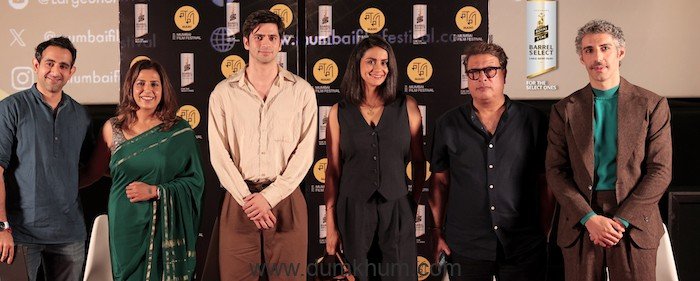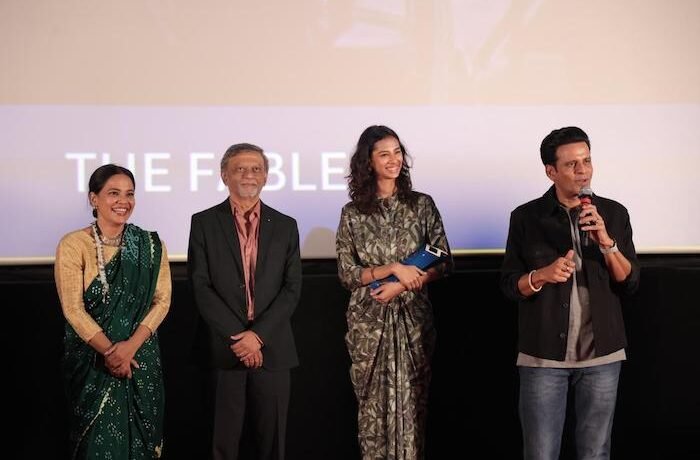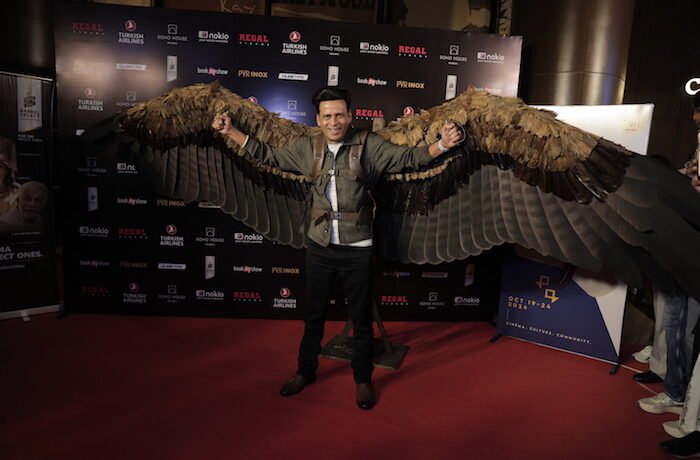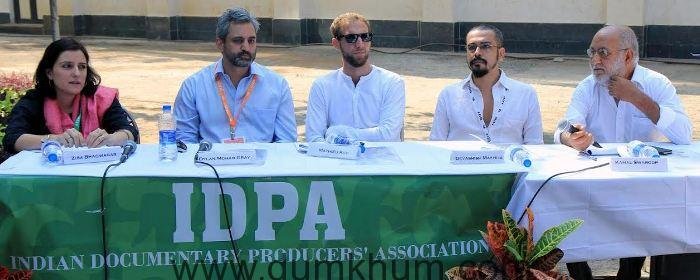Director is God, or God is Director?
Caption : IDPA Open Forum on ‘Make a documentary film as if you are shooting a feature, and a feature film as if you are shooting a documentary’ speakers Dylan Mohan Gray, Devashish makhija, Ziba Bhagwagar and Mathieu Roy, Moderator; Kamal swaroop at Films Division Complex today on February 01, 2016.
‘Make a documentary film as if you are shooting a feature, and a feature film as if you are shooting a documentary’. Indian Documentary Producers’ Association (IDPA)’s Open Forum on Monday, 01 February, had four panelists and a moderator giving their views on this subject. Award-winning director and screenplay-writer/teacher Kamal Swaroop, who made Om Dar-B-Dar in 1988, and was part of the unit of Richard Attenborough’s Gandhi, was the moderator.
The panel consisted of: Mathieu Roy, Canadian film-maker best known for his 2011 documentary, Surviving Progress, and member of the jury at MIFF; Ziba Bhagwagar who started her career as a journalist and then made ad films and is known for her film Scattered Windows, Connected Doors; Devashish Makhija, who assisted Anurag Kashyap on the controversial feature Black Friday, and also assisted in Bunty Aur Babli; Dylan Mohan Gray, of Punjabi-Irish parentage and trained a historian, has worked in various capacities on feature films with acclaimed directors, including Fatih Akin, Peter Greenaway, Paul Greengrass, Deepa Mehta and Mira Nair, and made the widely lauded Fire in the Blood, a feature-length drama on serious concerns in the world of pharmaceuticals.
In an era when boundaries are blurring, the general view was that films should no longer be classified as documentaries or features. Roy, who has served as Martin Scorsese’s personal assistant , reminded the audience, “Werner Herzog (renowned German film-maker) uses mise en scène and even faked monologues in his so-called documentaries.” He also lamented that financers (“funders”) insist on knowing even detailed dialogue, which may not be possible in a non-feature film. I wanted to make a film in the Congo, where the protagonist would be put in a situation and the events and the dialogue would follow. This had no takers, because the financiers wanted to know what they would say, in advance. It is for reasons like this that they prefer financing features.” Gray said it was important to know who you are making the film for. “Fire in the blood was for an educated urban audience. But when it comes to the rule book….I am against any rule book.”
Swaroop wanted the panel to consider a concept like time and time structure. “Take a film like Boyhood. It traces the life of a young boy and was shot over twelve years. How does it affect the film-making process?” In response, it was generally expressed that feature films are in the present, largely, but documentaries may have as totally different concept of time and events. Bhagwagar used this criterion for differentiating between feature films and documentaries: “Is it real? Or, is it a figment of my imagination?”
An interesting quote summed-up the debate. Suspense-king British director, Alfred Hitchcock (died 1980) said, “In feature films the director is God; in documentary films God is the director”.
SS/NS









